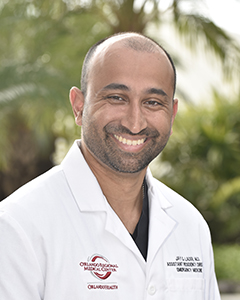Hurricanes, swimming pools and extreme heat are part of daily life, especially in warmer climates. They’re also responsible for many ER visits every year, all of which can be prevented with a little planning and extra attention paid to safety.
Here are five mistakes you should avoid during an emergency.
Say Yes to the Ambulance
You may think that driving yourself or a family member to the ER is quicker and cheaper while posing no risk, but that’s not the case. Call 911 immediately if you are experiencing:
- Acute neurologic symptoms
- Trouble speaking
- Gait imbalance
- Sudden loss of balance
- Significant chest pain
The difference could mean saving a life. In an ambulance, medics immediately start evaluating you. By the time you arrive at the hospital, your neurological function has already been assessed and the medical team has decided next steps. The medics also start IVs, which further save time. Ambulance drivers choose which hospital they take you to, matching you according to your circumstances. If it’s a stroke, for example, the medics will transport you to the best hospital for stroke care. Should you skip the ambulance and drive to a hospital that is not the best match, you may need a helicopter to then transport you to the right hospital.
Keep Your Eyes on Kids in the Pool
We all think we are doing everything we can to keep our kids safe in the pool, but we may be overlooking a few key practices. It takes just seconds for a child to sink to the bottom, and this can be true even for strong swimmers. It’s also important to understand that when a child is drowning, there may be no splashing. To avoid drowning accidents, always keep your eyes on all kids in the pool. Make sure no child is underwater for too long. Prevention is the key to preventing child drowning.
Stock Up on Your Meds Before Hurricane Season
If you rely on medication, be sure to stock up as part of your hurricane preparation. People often prepare for storms by buying water, bread and toilet paper, but they forget to refill prescriptions that they need on a daily basis. If winds are above 50 mph, ambulances stop transporting people to the hospital.
Keep in mind that after the storm, the ER sees a surge of people needing medical attention. For those who come to the ER for last-minute refills of medicine, the wait times can be much longer than anticipated.
Pay Someone Else to Trim Trees Before or After a Storm
It’s wise to trim trees before a hurricane or removing fallen trees after the storm, but doing it yourself is not. One of the most common injuries seen in Florida ERs is falls from roofs when people attempt to cut tree limbs. Climbing on roofs and ladders is a risk already, then consider that you may not know which direction a tree or limb will fall after it has been severed. The tree or limb could land on you, or you could be injured when trying to move out of the way.
Tree trimming is dangerous even if you’re not climbing on the roof. After a storm, the ground absorbs excess rainfall, making trees much less stable and much more prone to falling. Avoid pushing and manipulating trees loose in the ground. Trees blocking driveways or yards are annoying but are certainly not worth a possible ER visit.
Avoid Heatstroke
You might see roofers or lawn maintenance crews outside and think that it’s safe to work outdoors in extreme heat. What you may not realize is that many of these workers have conditioned their bodies to be accustomed to extreme conditions. Many of them are young and healthy, making them more able to sweat easier.
For everyone else, heat poses the risk of heatstroke.
You are at a higher risk of heatstroke if:
- You take beta-blockers
- You take any blood pressure medicine
- You take calcium-channel blockers
- You are older than 65 years
These medicines slow your heart rate and affect blood pressure, making it harder for your body to cool itself. They don’t allow your heart rate to increase the way it needs to in the heat, increasing your risk of passing out if you’re not properly hydrated. If you’re over 65 years of age, you are also more likely to pass out from the heat.
If you or someone you love starts to act not like themselves, it’s time to go to the ER as heat stroke can cause irreparable brain damage.
To avoid heatstroke:
- Stay in the AC
- Don’t go outside during the peak of the day to garden or take a walk
- Pick the coolest time of day early in the morning to go outside
- Drink water, not sports drinks with lots of sugar
With heat stroke, as with many injuries and conditions, prevention is the best route to stay healthy and safe.
Choose to Stay in Touch
Sign up to receive the latest health news and trends, wellness & prevention tips, and much more from Orlando Health.
Sign Up





